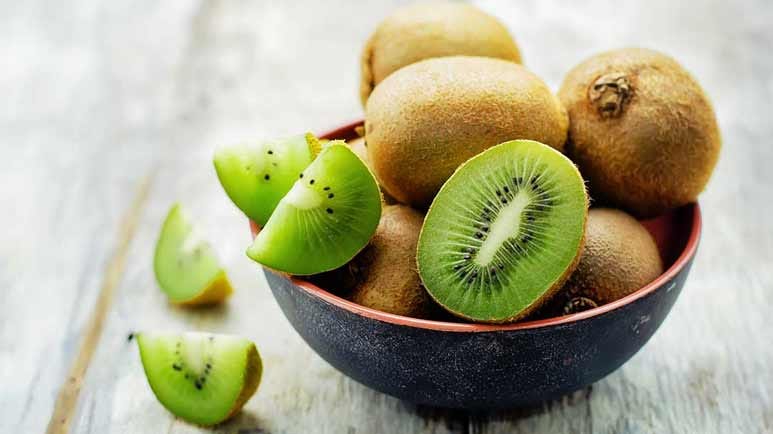Kiwi for Constipation — How Many to Eat, How Fast It Works, and Who It's For
Description
STORY AT-A-GLANCE
Whole kiwifruit, especially the green variety, is now recognized as one of the few foods with strong clinical evidence for relieving chronic constipation when eaten daily
The most effective intake is two kiwifruits per day, maintained consistently for two to four weeks; this amount supports measurable improvement in stool softness and frequency without the side effects of stimulant laxatives
Kiwi works through a unique combination of water-holding fiber and the enzyme actinidin, which together enhance digestion, hydration, and intestinal motility for smoother, more regular elimination
People with infrequent or difficult bowel movements often find kiwi easier to stick with than prunes or psyllium because of its taste, texture, and natural sweetness, helping them stay consistent long enough to see results
For best results, begin with a three-day at-home trial — one kiwi with breakfast and one with dinner — track your comfort and bowel pattern, and continue for four weeks if improvement begins within the first few days

Constipation affects nearly 16% of adults across the United States.1 Chronic constipation, which comes with symptoms like abdominal discomfort, bloating, and incomplete evacuation, can lead to hemorrhoids, anal fissures, and other painful complications if left unresolved.
For decades, the standard approach to treating constipation involved high-fiber diets or over-the-counter laxatives. Yet, one recent study found that eating a small, nutrient-dense fruit — kiwifruit — offers surprising benefits in easing this common bowel issue.
Does Eating Kiwi Actually Relieve Chronic Constipation?
The newest evidence supporting the benefits of kiwifruits for constipation comes from comprehensive dietary guidelines set by researchers from King’s College London. Their findings, which were endorsed by the British Dietetic Association (BDA), were published in two international journals, the Journal of Human Nutrition & Dietetics and Neurogastroenterology & Motility, highlight kiwifruit among the few foods with robust evidence for alleviating chronic constipation.2
Identifying which strategies work for constipation (and which ones don’t) — The new guidelines synthesized results from four large systematic reviews and meta-analyses, which included a total of 75 randomized controlled trials (RCTs).
<label class="hide-text" contenteditable="false">Text within this block will maintain its original spacing when published</label>Each finding was graded for scientific strength using the rigorous Grading of Recommendations, Assessment, Development and Evaluation (GRADE) framework for evaluating dietary interventions. These findings were then agreed upon by a panel of experts through a rigorous consensus process.3
The results — The researchers came up with 59 clear, evidence-ranked recommendations to guide both healthcare professionals and patients. They found that green kiwifruit, psyllium husk, rye bread, and high-mineral water were most effective against constipation. Meanwhile, broad “high-fiber diet” advice alone was shown to have weak or inconsistent outcomes. According to a report from News-Medical.net:
“The guidelines … aim to transform the way this common condition is managed by doctors, nurses and dietitians in clinical practice. The guidelines could also allow better self-management of symptoms, particularly through foods and drinks.”4
Kiwifruit helps naturally ease constipation — Unlike over-the-counter laxatives that simply force motility, kiwifruit appears to restore a more natural rhythm in the gut by improving both stool hydration and transit efficiency. In other words, it helps your body work with digestion, not against it.
The study cements the notion that the first step to managing constipation is through dietary changes — Dr. Eirini Dimidi, the study’s lead author, summarized the team’s findings succinctly, saying, “For the first time, we’ve provided direction on what dietary approaches could genuinely help, and which diet advice lacks evidence.”5
How Many Kiwifruits Will Help Ease Constipation (and How Long Until You See Results)?
When it comes to how many kiwifruits you need to eat for constipation relief, clinical evidence has converged on a clear starting point — two whole green kiwifruits per day. That’s the dosage most frequently tested in controlled trials. One example, a prospective randomized, single-blinded, crossover, controlled 16-week trial published in the American Journal of Gastroenterology, used this amount.6
Conducting the study — The study involved 184 adults, including 63 healthy participants, 60 people with functional constipation, and 61 participants with irritable bowel syndrome with constipation (IBS-C). Each participant consumed two green kiwifruits daily for four weeks and later switched to taking 7.5 grams of psyllium husk, a common fiber supplement, for another four weeks. Between the two phases, they took a short break to clear any lingering effects.
Clinical participants who followed the two-kiwi regimen experienced improvements quickly — When the results came in, they found that those who ate kiwifruit experienced about 1.5 to 1.7 more complete bowel movements per week, which doctors consider a meaningful improvement. Participants also reported feeling less bloated, less strained, and more comfortable overall.
So what’s in a kiwifruit that makes it so beneficial for digestive health? Apparently, two medium-sized green kiwifruits provide roughly 6 grams of total dietary fiber, both soluble and insoluble. According to the study:
“Fiber found in kiwifruit cell walls has a large swelling and water-holding capacity in vitro, which can lead to stool softening and increased stool frequency. Other components of kiwifruit, for example raphides, may alter mucin production, leading to improved laxation.”7
Kiwifruit also contains actinidin — In addition to its phytonutrients and antioxidants, kiwifruit also has actinidin, a digestion enzyme that helps with digest






